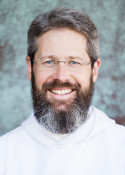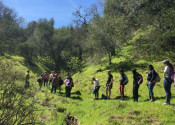FROM THE RECTOR
Technical Fixes & Adaptive Changes
This past week Liz and I joined with colleagues from around the Diocese of California (roughly from Novato to Brentwood to Livermore to Fremont to Palo Alto) for the annual Clergy Retreat at the Bishop’s Ranch. Our presenter this year was the former Bishop of Chicago and Presiding Bishop, Frank Griswold.
Bishop Griswold opened up the subjects of Prayer, Word and Sacrament, and Discernment through the lens of the spiritual classics of the Christian Tradition. Then, to close our time together Bishop Marc led us in conversation around sustainability. What I found fascinating was seeing the different directions that the small groups of clergy went in their exploration of inward and outward sustainability.
Given Bishop Marc’s instructions, many of us talked about the climate and the shifts that are necessary to meet the years ahead. Others, though, talked about how they do not see a path of sustainability in their congregations in the years to come, particularly if the last decade is any guide.
In all of these conversations I kept thinking of a particularly helpful insight from two scholars in the field of Education, Robert Kegan and Lisa Lahey. In much of their work for over the last decade, they have distilled the experiences of individuals and organizations as they attempt to make a significant change.
One of their observations is that often when we are confronted with a challenging situation, one that demands a considerable shift—to my mind the state of the Episcopal Church in the 21st century—adaptive change is necessary, but we often turn to technical fixes.
I have found this to be just as true in my own personal life as I’ve seen it to be true in organizations of all kinds. And I’ve encountered my own resistance to change I’ve wondered, “Why is it so hard to be willing to engage in adaptive change? Why are technical fixes so alluring?”
I believe that there are several possible reasons: we often want the issue to be solved quickly, and true adaptation takes sustained effort over time. We often want to be able to do what we’ve done before—because at one point in time it worked—and it takes energy and imagination to create a new way forward. But most powerfully, what Kegan and Lahey argue (and what the Christian tradition has affirmed over centuries) is that we don’t want to face the hidden competing commitments that lie underneath an unwillingness to change.
This is what I think was so interesting in our conversation around sustainability, as I heard a new willingness to address our deeper attachments to the Way Things Are. There are many hidden competing commitments that we hold as we look to see how we need to individually and collectively re-form our lives to mitigate the effects of climate chaos. The same is true with the necessary shifts for the Episcopal Church in the years to come.
The teachings of Robert Kegan and Lisa Lahey and my own experience tells me that if we lack the courage to unearth these unacknowledged commitments, that the plans we make will simply be technical fixes that aren’t able to fully address the significant challenges at hand.
Peace,
Phil+
On the Feast of St. Francis
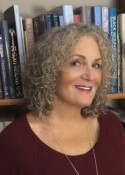 The Feast 0f St. Francis marks my husband Jack’s and my fourth anniversary as members of All Souls.
The Feast 0f St. Francis marks my husband Jack’s and my fourth anniversary as members of All Souls.
We found this church when we brought our dog Georgia to the Blessing of the Animals— that may have also been the year Phil and Liz got up on the roof to bless the new solar panels.
And all of this appealed to us, the lighthearted energy we found here, offering the assurance that being serious in your pursuit of faith need not make you somber or judgmental. Here we found so many well-spoken, knowledgeable and interesting people from all kinds of faith backgrounds, all passionately engaged in an on-going and very personal discussion of matters of faith and doubt.
I was drawn to the openness of this community — one in which all souls are welcome, so different from the Episcopal Church in which I was raised. I’ve always loved our rite, the standing-sitting-kneeling-crossing yourself ways in which we go about our practice – it feels, at best, as mindless as dance. I love how our practices are grounded in the ancient, how they are brought here into the physical present by the bodily involvement of our communal acts.
The beautiful language, the hymns, the orderly progression of the liturgical year— all this was and is deeply appealing to me and I’ve never found a practice in which I feel more at home or at peace.
The church I grew up in was, by contrast, not only rigidly hierarchal, it was entirely male dominated. Its tone struck me as aloof, even disdainful — if you didn’t understand what was going on, well so what? you — a child, a girl — were not expected to. One did not, for instance, read the Bible, the joke being that if one was a High Church Episcopalian one had people to do that for you.
Jack and I are both native Californians — I was born here in Berkeley, he in the then-rural community of Livermore. His was a large tightly knit family of devout Southern Baptists.
My husband was possessed of a mighty faith as a youth, consumed by his reading of the Bible and had begun college as a homiletics and pastoral theology major. His descriptions of his abrupt loss of faith are eloquent, how he strode away from both that church and his family to find an essentially atheistic practice devoted to great literature. He began then too a lifelong practice of study with a Zen Buddhist teacher. Toward institutional Christianity he exhibited what looked to me like the cynical antipathy of the broken hearted.
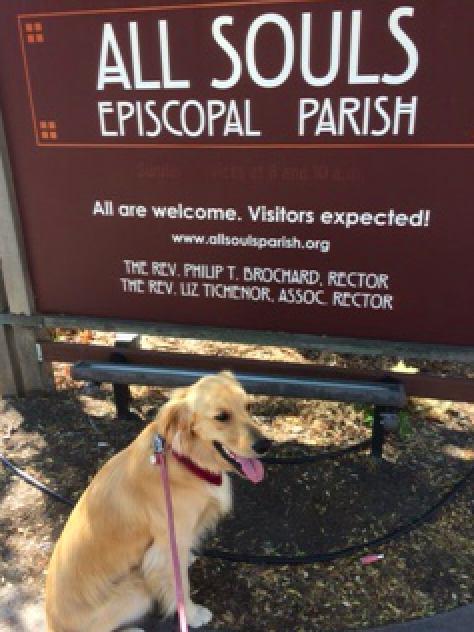 Brought here then by the wisdom of our dog, we’ve stayed because we began immediately to find ourselves in fellowship with interesting like-minded people. We found Emily — she and Megan had also just arrived. We took a Catechumenate class with Emily, then another Catechumenate class, a third! We began to regularly attend Formation classes and to sit in the chapel with others in the hour between services to look carefully at Bible verses. I have since been reaffirmed in the faith. My husband continues to study, so far reserving judgment.
Brought here then by the wisdom of our dog, we’ve stayed because we began immediately to find ourselves in fellowship with interesting like-minded people. We found Emily — she and Megan had also just arrived. We took a Catechumenate class with Emily, then another Catechumenate class, a third! We began to regularly attend Formation classes and to sit in the chapel with others in the hour between services to look carefully at Bible verses. I have since been reaffirmed in the faith. My husband continues to study, so far reserving judgment.
And we’ve now embarked on the program called EfM. Part of this work is to not only read the entire Bible but to look at translations, church history, major secondary sources – we will spend four years in the process. We show up on Wednesday evenings — together with a group of from 8 to 12 other parishioners — to engage with scripture in a personal way. We’re interested in finding out not only what all this actually says but how these teachings might be enacted in Christian fellowship in our modern day lives.
Jack and I each arrived here sharing an old and deep suspicion of the other’s brand of Christianity— Baptists aren’t entirely sure Catholics — and the Anglican variety by extension — even are Christians. For our own snooty part, the foregone assumption was that Fundamentalists, being basically irrational, were always fighting the urge to lapse back into tongues and mess with snakes to prove the tenacity of their faith.
What Jack’s and my very different childhoods shared was the practice of going to church all the time, our families not only attending services on Sundays but engaging in the work of creating a dynamic, evolving church community. Doing this is easy, as it turns out, in that all you need to do is to continue to show up.
And it is this habit of worship at All Souls that we practice together — albeit differently — that each of us cherishes most.
—Jane Vandenburgh
On Stephen Ministry
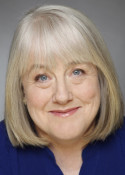 When at all possible, if I am asked for a favor, to do a task, to give something, I say yes. Most of the time, I feel rewarded. Sometimes along the way, I have felt trapped because I had no healthy sense of how to set boundaries and followed my “say yes” protocol to a dangerous fault. Those instances are few in memory, and thank God I never came to any harm. When I became a parent, I had my work cut out for me, but I had the tremendous good fortune of being in a loving two-parent household where two incomes were not required to keep body and soul together. I had lots of time and many opportunities to say yes to committees and teams and field trips and projects and campaigns and classrooms. I was able to be with my kids for everything (whether they liked it or not).
When at all possible, if I am asked for a favor, to do a task, to give something, I say yes. Most of the time, I feel rewarded. Sometimes along the way, I have felt trapped because I had no healthy sense of how to set boundaries and followed my “say yes” protocol to a dangerous fault. Those instances are few in memory, and thank God I never came to any harm. When I became a parent, I had my work cut out for me, but I had the tremendous good fortune of being in a loving two-parent household where two incomes were not required to keep body and soul together. I had lots of time and many opportunities to say yes to committees and teams and field trips and projects and campaigns and classrooms. I was able to be with my kids for everything (whether they liked it or not).
Fast forward 15 years, and I am busy at church and at school, now with teenagers. I think we had just wrapped up a campaign to furnish another Godly Play classroom here at our growing All Souls, and I had reached the heights of crafty-ness with a “Giving Tree” with actual branches on which I hung apple cutouts with glossy pictures of Godly Play sets and their pieces with sponsorship values from $5 to $50 to $500. I was pretty pleased with myself. Rev. Kristin Krantz invited me for coffee up the street and we made a date. I was absolutely sure she had something important to talk to me about, some new project she needed help with. Sitting with our hot beverages, she leaned in and said, “I wonder if you might find it helpful to have a Stephen Minister?” I’m probably paraphrasing her very eloquent overture, but that’s pretty much what I remember. I also remember hearing, “Girl, you are one hot mess right now, and you need help” which did not come from Kristin, but from that broken part of me that says mean things. I’m sure I broke down. I broke down realizing my struggles had been seen. I broke down in embarrassment realizing my struggles were not as expertly hidden as I thought they were.
Stephen Ministers are angels among us. In a few short days, Marilyn Flood met me in my home to discern the best match for me in a care giver. For the next year, maybe 18 months, I had regular visits with Judith Lothrop. I could never imagine a more perfect match, and very soon these visits were the highlight of the week, not an appointment but two souls gathered in His name. I believe Stephen Ministers have 50 hours of training. Whatever magic happens during that training, it manifests itself in the care giver’s assuring the care receiver feels held, heard, and valued. When our struggles are obvious—the death of family or friend, the loss of a job, or an upending life transition—we might feel comfortable asking for help, and Stephen Ministry is there. But I questioned whether my struggles “counted.” With all I had, did I have a right to be dysfunctional in any way? I was blessed that my challenges were noticed, noted, and investigated.
Our time together sometimes included prayer; when it did, the prayer was organic and spontaneous. There were silences, and these silences felt like warmth, shelter, and sustenance. There were words, often complete sentences, and laughter that shattered sorrow even if only for a few minutes. I want you to know my greatest gift from Stephen Ministry. Relief. When I pray for friends or strangers, I often find I ask for relief for them. Relief from pain, relief from emotional paralysis, relief from feeling judged, relief from questioning whether their troubles are worthy of notice. I experienced all of that relief within the Stephen Ministry. That “yes” was definitely among the most rewarding.
I realize I haven’t spelled out what my struggles were. I’m not being coy or evasive. I don’t have words for the storm of emotions that troubled me. Don’t wait for a clinical diagnosis or definition; if you are struggling, ask someone to walk alongside you for a time. Ask for a Stephen Minister. And if you are fortunate to have one offered you without your asking, say yes.
With gratitude,
—Maggie Cooke
Fall Programs at the Bishop’s Ranch
Are you missing the beauty and quiet of the Bishop’s Ranch? Or maybe you couldn’t make it to the Parish Retreat this year? Here are a number of upcoming programs at the Ranch — some for a day, some longer — take a look and sign up!
Fall Hike – October 19
Spend a Saturday walking the little-known trails of The Bishop’s Ranch and explore its many habitats.
A Day of Yoga with Marie Hirsch – November 9
Use breath and meditation to deepen your understanding and appreciation of yoga. Our focus will be on choosing what opens your heart, supports your health, and uncovers your inner wisdom.
Song & Silence – November 22-24
Join a circle of voices in experiencing Hildegard’s music the way she shared it with those around her, through a gentle, contemplative process of listening, then singing what we hear. St. Hildegard of Bingen—a 12th century sage, visionary, healer, naturalist, poet, counselor, and composer—has blessed us with a rich legacy of spirit-lifting, heart-opening music. Her songs are encoded with wisdom and inspiration and stir the spirits of everyone who sings them.
Sweet Chariot: The Gift and Wisdom of Black Spiritual Music – December 7
Come and explore our relationship with our ancestors and our current place in history through the Black Spiritual, one of America’s most lush and beautiful oral traditions, a music filled with resilience, insight, healing, and power. Taking these songs as our guides, this workshop focuses on identity, empathy, honoring the gift of life, and better understanding ourselves and one another. And, of course, joining together in song. No previous singing experience is necessary.
Feast of St. Francis & Blessing of the Animals
This Sunday, October 6th
All pets welcome! Stuffed animals, too! Bring your favorite beasts to either the 7:30 or 11:15 services. The main Blessing of the Animals will be after the 11:15 service, around 12:30, in the courtyard. All are welcome… but please keep predators leashed.
BLESS THIS MESS: DIGGING INTO PARENTING AND FAITH
Conversation with the author + playdate and potluck
Last call! Please sign up here, so we can be sure to have sufficient childcare!
Parents, mark your calendars! This Saturday, October 5th, 4:00 – 6:30 pm, we’ll be coming together for a special event. Rev. Molly Baskette is the senior pastor at First Congregational Church, just on the other side of the Cal Campus. She is also the co-author of a brand new book — Bless this Mess: A modern Guide to Faith and Parenting in a Chaotic World. In it, Molly tackles the thorny questions of parenting we all wrestle with at one time or another, from the perspective of a progressive Christian. Alongside this perspective, her co-author Dr. Ellen O’Donnell offers her wisdom as a child psychologist, helping us to understand more of what is going on developmentally at these different stages, and what might actually be helpful to our children.
So! We’ll have childcare on the playground from 4-5:15, while the parents have time to hear from Molly and crack open this rich topic together. Her book will also be available to purchase if you don’t yet have it. Then we’ll enjoy a laid-back potluck together.




